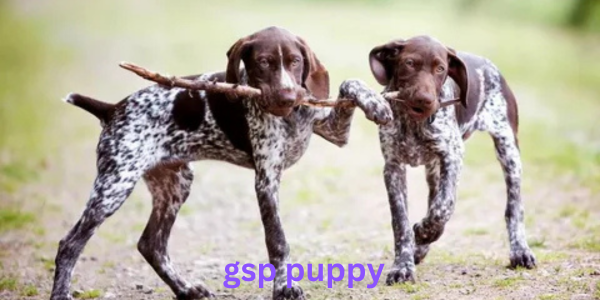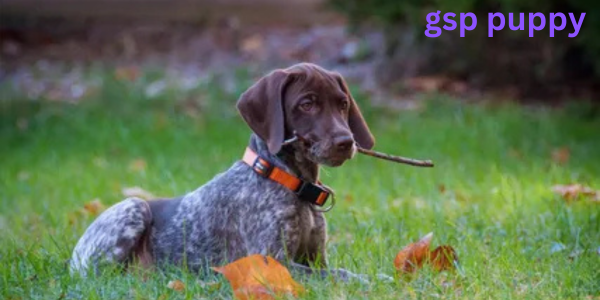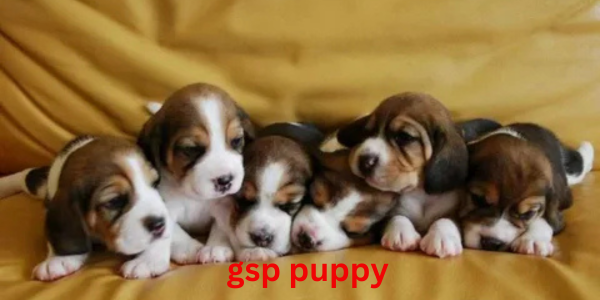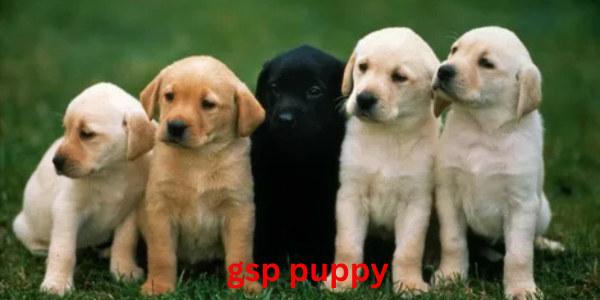
Introduction
Inviting a GSP (German Shorthaired Pointer) little dog into your house is an intriguing excursion overflowing with bliss and friendship. Known for their energetic nature and intelligence, GSP puppies are eager to please but require proper training to thrive. Training your puppy not only strengthens your bond but also helps shape their behavior, making them a delightful addition to your family.In this aide, we will cover successful preparation procedures that will assist you with raising a polite GSP pup. With consistency, patience, and love, you can enjoy a rewarding experience that sets the foundation for a happy life together.
Table of Contents
Understanding the GSP Puppy Temperament
GSP puppies are lively and curious, known for their friendly and affectionate nature. They are astute canines that flourish with mental and actual excitement. Understanding their personality is pivotal for powerful preparation.Understanding their demeanor is pivotal for viable preparation. These puppies are quick learners but can also be easily distracted, so maintaining focus during training sessions is important. They enjoy activities that challenge them, such as fetching or agility courses. By recognizing their unique traits, you can tailor your training approach to keep them engaged and motivated. Establishing a strong connection with your puppy will also enhance their willingness to learn and follow commands.
Essential Commands Every GSP Puppy Should Know
Training your GSP puppy to respond to basic commands is vital for their safety and well-being. Start with essential commands like “sit,” “stay,” “come,” and “leave it.” These commands provide a foundation for more advanced training later on. Use clear, consistent cues and reward your puppy with praise or treats when they follow your commands. Begin training in a quiet environment with minimal distractions, gradually introducing new settings as they become more confident. Practicing these commands regularly will reinforce their learning and help them respond promptly. A well-trained puppy is not only easier to manage but also more secure in various situations.
Positive Reinforcement: The Key to Training Success

Positive reinforcement is one of the most effective training techniques for GSP puppies. This method involves rewarding your puppy for desired behaviors rather than punishing unwanted ones. Rewards can include treats, praise, or playtime. This approach creates a positive association with good behavior and encourages your puppy to repeat those actions. Consistency is crucial; always reward your puppy immediately after they perform the desired behavior. This technique builds trust betweenOver the long run, you can continuously lessen treats while proceeding to offer acclaim. you and your puppy, making training a fun and enjoyable experience for both of you.
Socialization Tips for Your GSP Puppy
Socialization is a critical aspect of raising a well-adjusted GSP puppy. Introducing your puppy to various people, animals, and environments helps them develop confidence and reduces fearfulness. Start socialization early, ideally during the critical period between 3 and 14 weeks. Arrange playdates with other vaccinated puppies and take your GSP to different locations, such as parks and pet-friendly stores. Guarantee these encounters are positive by offering treats and acclaim. Avoid overwhelming your puppy; gradual exposure is key. A well-socialized puppy is more adaptable and less likely to develop behavioral issues later in life, making this an essential part of their training.
Creating a Structured Training Schedule
A structured training schedule provides consistency for your GSP puppy, which is vital for effective learning. Set aside specific times each day for training sessions, ideally lasting about 5 to 10 minutes. Short, successive meetings are more viable than longer, irregular ones. During these sessions, focus on one command or behavior at a time to prevent confusion.Keep the air positive and enjoyable to keep up with your pup’s advantage.Consistency in timing and routine helps your puppy understand what is expected of them and fosters a sense of security. A well-organized approach makes training enjoyable for both you and your puppy.
Common Training Challenges and How to Overcome
Training a GSP puppy can come with its challenges, such as stubbornness or distractions. It’s important to remain patient and persistent when facing these hurdles. If your puppy struggles with a particular command, break it down into smaller steps and practice each one until they grasp the concept. Avoid negative reinforcement, as this can lead to fear and anxiety. Instead, focus on redirecting their energy and providing alternatives for unwanted behaviors. For example, if your puppy jumps on guests, teach them to sit when greeting people. Conquering difficulties together reinforces your bond and assembles trust.
Fun Activities to Keep Your GSP Puppy Engaged

Keeping your GSP puppy engaged is essential for their happiness and development. Incorporate fun activities into their routine to stimulate their mind and body. Games like fetch, hide-and-seek, or agility training can be enjoyable and beneficial. Puzzle toys can also provide mental challenges, encouraging your puppy to problem-solve. Regular exercise is crucial for a breed known for high energy, so plan daily walks and playtime. Rotate activities to keep things fresh and exciting, preventing boredom. Engaging your puppy not only enhances their training but also fosters a deeper bond between you as you share enjoyable experiences together.
Maintaining Consistency in Training
Consistency is a crucial rule in preparing your GSP doggy. Utilize similar orders and signals each chance to keep away from disarray. Guarantee that all relatives are in total agreement with respect to preparing strategies and rules. For example, if you don’t want your puppy on the furniture, make sure everyone enforces that rule. This uniformity helps your puppy understand what is expected of them. Additionally, be consistent with rewards; always recognize good behavior to reinforce it. A consistent approach builds confidence in your puppy and leads to more effective training outcomes, creating a well-mannered companion.
Recognizing and Rewarding Good Behavior
Recognizing and rewarding good behavior is key to effective training. Always pay attention to your puppy’s actions and be quick to praise them for following commands or exhibiting positive behavior. Use treats, verbal applause, or petting as remunerations. This affirmation urges your pup to rehash the conduct from here on out. It’s essential to reward them immediately so they can connect the action with the reward.Consider saving a treat pocket helpful during instructional meetings for simple access. By focusing on positive reinforcement, you’ll foster a sense of achievement in your puppy, making them eager to please you.
When to Seek Professional Help for Training

While many training techniques can be done at home, some situations may require professional help. If your GSP puppy exhibits persistent behavioral issues, such as excessive barking or aggression, a professional trainer can provide valuable guidance. Look for trainers who use positive reinforcement methods and have experience with your breed. Group classes can also offer socialization opportunities and help with training challenges. Don’t hesitate to seek help if you feel overwhelmed; getting support early on can lead to better outcomes for you and your puppy. A professional can provide tailored strategies that suit your specific needs.
Conclusion
Training your GSP puppy is a rewarding endeavor that requires time, patience, and love. By implementing effective training techniques, you’ll not only help your puppy become a well-mannered companion but also strengthen your bond. Remember to focus on understanding their temperament, using positive reinforcement, and maintaining consistency throughout the training process. With dedication and care, you can enjoy a fulfilling journey with your GSP puppy, creating lasting memories together. Happy training!
FAQs about Training GSP Puppies
1. How long should training sessions be for my GSP puppy?
Instructional courses should go on around 5 to 10 minutes. GSP doggies certainly stand out ranges, so more limited, continuous meetings are more successful than longer ones.
2. When would it be advisable for me to begin preparing my GSP little dog?
You can begin preparing your GSP pup when you bring them home, preferably around two months old. Early preparation lays out beneficial routines and ways of behaving.
3. What are the best compensations for preparing a GSP doggy?
Treats, recognition, and recess are incredible prizes. Find what inspires your doggy the most and use it to support positive way of behaving.
4. How might I mingle my GSP doggy?
Open your doggy to various individuals, creatures, and conditions progressively. Organize playdates and visit stops or pet-accommodating areas to assist them with acquiring certainty.
5. How would it be a good idea for me to respond on the off chance that my GSP doggy isn’t answering orders?
On the off chance that your little dog is battling, separate the order into more modest advances and practice in an interruption free climate. Be patient and reliable in your methodology.
6. How might I keep my GSP doggy from biting on furnishings?
Give proper bite toys and divert your doggy to them when you find them biting on furnishings. Reliably remunerating acceptable conduct will assist with building up this.
7. Would it be a good idea for me to enlist my GSP pup in an instructional course?
Indeed, signing up for an instructional course can be useful. It furnishes proficient direction and socialization potential open doors with different canines and individuals.
8. How frequently would it be advisable for me to prepare my GSP little dog?
Go for the gold meetings to build up learning and keep up with your doggy’s advantage. Consistency is critical to effective preparation.
9. Is it typical for my GSP little dog to be obstinate?
Indeed, GSP doggies can be a piece difficult on occasion. Remain patient and utilize uplifting feedback to energize consistence as opposed to turning to negative techniques.
10. When would it be a good idea for me to look for proficient assistance for preparing?
On the off chance that you experience persevering social issues or feel overpowered, looking for proficient assistance from a coach can give customized methodologies and backing.



